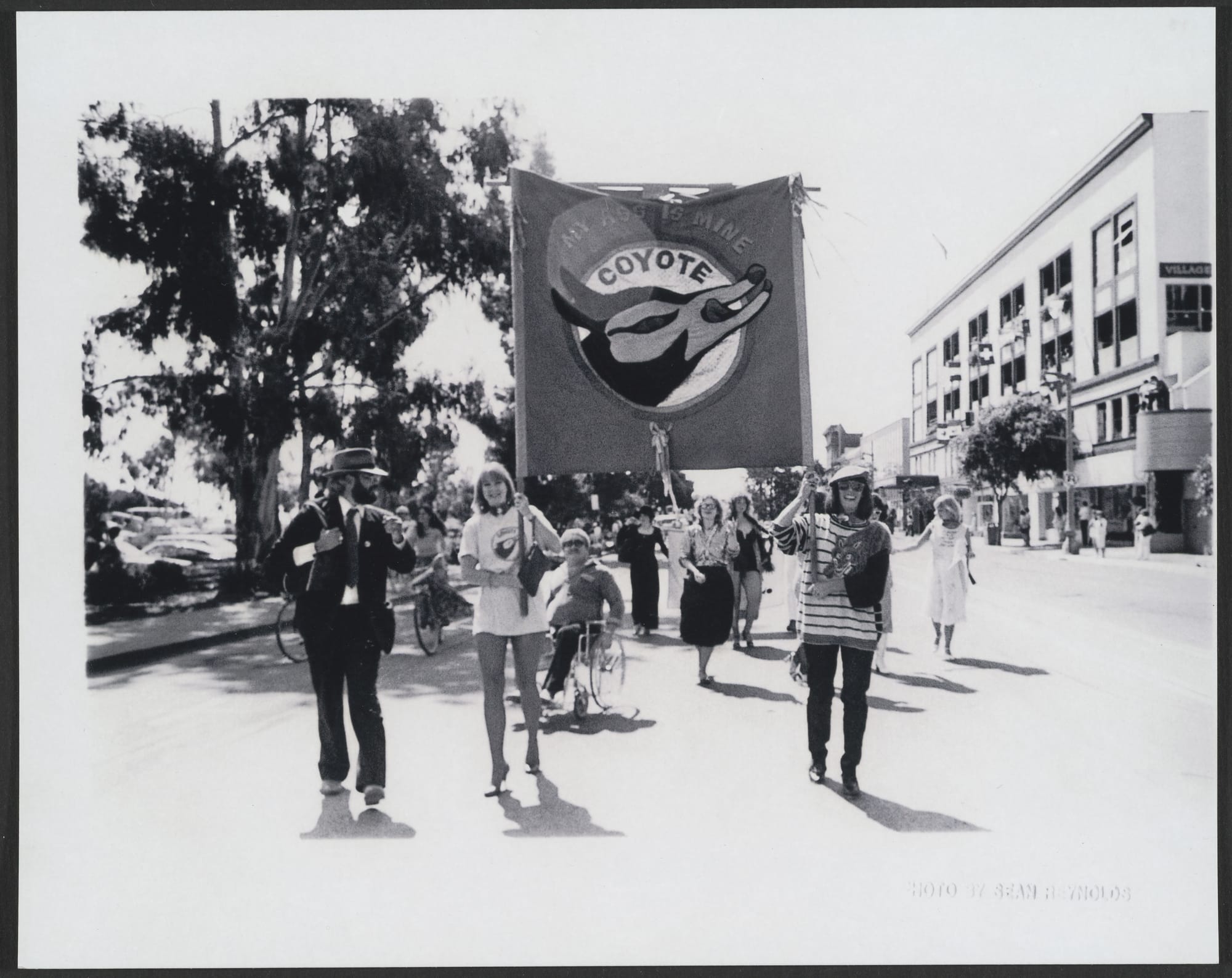How Racket, Minneapolis’s Worker-Owned Newsroom, Is Covering Its Hometown Fascist Invasion
“This is the worst fucking time. But watching people’s response to ICE has been the most affirming thing in the world.”


“This is the worst fucking time. But watching people’s response to ICE has been the most affirming thing in the world.”
This week we've got strikes, slime, white rappers, psychics, goth nights, and more.
It’s time to stop waiting around for those in power to save us. We, the people, can get everyone’s basic needs met.
Margo St. James’s sex worker advocacy group first coined COYOTE, which stood for Call Off Your Old Tired Ethics.

Naming a publication is fun until it’s not, at which point it becomes a major pain in the ass. How does one encapsulate a set of values, a sense of place, and a tone in something pithy, catchy and memorable?
We found all of the above in the Bay Area’s pesky, wily coyote. As this publication took shape, we embraced the animal we named ourselves after — howls, claws, fangs, and all. We are fierce and unapologetic. We are adaptive and playful. We are COYOTE Media Collective.
But we are not the first COYOTE in the Bay Area.
In 1973, a smart and charismatic San Francisco resident named Margo St. James launched a powerful advocacy organization that shifted narratives on sex work beyond sensationalized headlines on arrests and toward nuanced conversations about patriarchy, power, labor, and the resilient workers at the center of it all.
St. James’ COYOTE all started with a dirty cop and a set-up.
In 1962, as she played records in her apartment, St. James unwittingly buzzed up a cop who had identified himself as a “friend-of-a-friend.” He busted her for prostitution and keeping a “disorderly house.”
“When she went to trial, she told the judge, ‘Your honor, I've never turned a trick in my life’,” her secretary, Molly Bode, told me in an interview last month. “And the judge said, ‘A decent woman would not know that word,’ and locked her up.”
After that, St. James thought she might as well become a “whore” — her preferred terminology for herself.
“How are you going to argue with a woman who knows she can make $100 a night fucking, but you have to do a whole week as a file clerk for the same $100?” St. James said in an interview with the now-defunct alt-weekly Northwest Passage. “And being a whore is more fun.”

It was a good living — unless you got caught. In 1960s and ‘70s San Francisco, cops would solicit sex workers, take them to a hotel room, have sex, and then arrest them. Policy at the time was for sex workers to be held in jail without bail until they passed a mandatory sexually transmitted disease test. Due to a lack of information or good representation, women often pleaded guilty to evade more serious sentences, impacting their ability to get hired for other jobs.
“I was hanging around the San Francisco jails, watching how the women were being processed in and out,” St. James said in her interview with the Passage. “The whole process was totally unfair to them. I said to [then-San Francisco Sheriff] Richard Hongisto, ‘Why isn’t something being done to stop the victimization of the hookers?’ and he said to me, ‘Nothing will be done until someone from the victim class speaks out.’ That’s when I made the decision to start COYOTE.”
It was author Tom Robbins, with whom St. James was mushroom hunting in Marin, who first tossed out the name — likening her to the trickster legend. Another friend turned it into an acronym: Call Off Your Old Tired Ethics.
At COYOTE’s founding in 1973, St. James estimated there were 5,000 sex workers in the Bay Area. A mere six months after COYOTE launched, she’d enlisted 10% of them to fight for their rights.
Still, it was a scrappy beginning. She rented a cheap hotel room on the waterfront for an office and, per her account in the preface of “A Vindication of the Rights of Whores,” began using a copy machine she discovered on the eighth floor of the Pacific Gas and Electric Company on Beale Street. “During lunch hours for two years I dressed as a secretary and ran off the material necessary to be a successful rabble rouser,” she wrote.
St. James leveraged every connection she had — and by that point, she had a lot. She was friends with politicians, actresses, real estate developers, and journalists. She lined up criminal attorneys to defend women who were arrested, convincing them to do one pro bono COYOTE case a year. The group provided clothes for women to wear to court and assigned them volunteer case managers. She printed flyers on “HOW TO GET OUT OF THE BIN ON YOUR OWN RECOGNIZANCE,” and handed them out to sex workers on the street.
COYOTE provided sex workers a platform to have a voice, and they shouted. In the paper “COYOTE Howls,” they spoke out about rape, assault, murders, dirty cops, setups, backward laws, and horrible clients. Its final 1978 edition featured a piece analyzing Christian morals titled “Women, Whores, and Witches”; an opinion column on whether sex workers should disclose the names of their male clients to shift regressive laws on their profession; and dispatches from other publications around the world, including one from a British publication on how “Hookers and Housewives Come Together.” At its height, the mailing list reached 60,000 people.
All of this work was expensive, and in 1974, St. James proposed the group launch a Hooker’s Ball at the Longshoreman's Hall to raise funds for their work. The theme was “No Hippo Critters,” and it featured rock bands, costumes, and jugglers; hundreds of people attended.
By the time 1978 rolled around, COYOTE and St. James were so renowned that the Hooker’s Ball drew 20,000 attendees to the Cow Palace, including Prince Charles and the city’s police chief. “Puppets, belly dancers, glitter, flash, nuns, witches, wizards and sheiks,” read a poster for the event. St. James rode in on the back of an elephant.
All this noise shifted conversations around sex work beyond just coverage of arrests. “Manipulating the press was very important because through the exposure other women in other cities and countries were inspired to start groups,” she wrote in the aforementioned preface. “It seemed that the people necessary to make a good start were a political hooker, a feminist, a friendly journalist, and a lawyer.”
St. James moved to Europe, where she organized with existing groups there, and in 1985, helped launch the first World Whores’ Congress in Amsterdam.
But by the 1990s, St. James had begun to retreat from the public eye. She passed away in Bellingham, Washington in 2021. That same year, the San Francisco Board of Supervisors declared Feb. 14 “Margo St. James Day.” In recent history, she gave her name to the St. James Infirmary, a health clinic for sex workers which shuttered in 2023.
It’s an incredible legacy. As I reported this story, I fell deep into the St. James and COYOTE archives at the Schlesinger Library. I pored over news clippings, read interviews, and watched the nearly-three-hour-long tribute to St. James that was produced after her death in 2021.
During a tabling event at Rainbow Grocery in August, where we were doing outreach for our new media publication, two people stopped by to tell us their stories of the COYOTE of yore — marching down the streets for sex worker rights, and dressing up as a nun at the Hooker’s Ball.

With the help of a friend who used to work at St. James Infirmary, I tracked down a few people who knew and loved Margo St. James. All of them acknowledged COYOTE’s historical importance — because yes, it was incredible! But the majority of these interviews were spent recounting the spirit of a woman so magnetic and brilliant that she managed to change the conversation about sex work to one that centered humanity.
Behind all of this excitement and furor was a person who could do anything she put her mind to; she was a farmer, a marathon runner, a private detective, a law student, a candidate for supervisor, an organizer, an animal lover, a sex worker, and, above all, a really good friend.
As we bring our brand-new COYOTE into the world, we are both humbled and inspired by the one that came before us. “She’d be delighted!” to hear about us, one interviewee told me. We certainly hope so.

Nuala Bishari is an investigative journalist and opinion columnist who's reported on the Bay Area since 2013. She writes about public health, homelessness, LGBTQ+ issues, and nature.
View articles